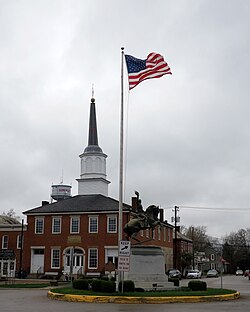Somerset, Ohio
| Somerset, Ohio | |
|---|---|
| Village | |

Old Perry County Courthouse in Somerset
|
|
 Location of Somerset, Ohio |
|
 Location of Somerset in Perry County |
|
| Coordinates: 39°48′25″N 82°18′4″W / 39.80694°N 82.30111°WCoordinates: 39°48′25″N 82°18′4″W / 39.80694°N 82.30111°W | |
| Country | United States |
| State | Ohio |
| County | Perry |
| Area | |
| • Total | 1.16 sq mi (3.00 km2) |
| • Land | 1.16 sq mi (3.00 km2) |
| • Water | 0 sq mi (0 km2) |
| Elevation | 1,083 ft (330 m) |
| Population (2010) | |
| • Total | 1,481 |
| • Estimate (2012) | 1,473 |
| • Density | 1,276.7/sq mi (492.9/km2) |
| Time zone | Eastern (EST) (UTC-5) |
| • Summer (DST) | EDT (UTC-4) |
| ZIP code | 43783 |
| Area code(s) | 740 |
| FIPS code | 39-72977 |
| GNIS feature ID | 1065343 |
Somerset is a village in Perry County, Ohio, United States. The population was 1,481 at the 2010 census.
Saint Joseph Church, the oldest Catholic church in Ohio, is located just outside Somerset on State Route 383.
The village of Somerset was established in 1810 by settlers from Somerset, Pennsylvania at the spot on Zane's Trace located midway between Lancaster and Zanesville. Seven years later, parts of Fairfield, Muskingum, and Washington counties were merged to create Perry County, and the house of a Somerset resident was named the first temporary courthouse. In 1819, the county government arrange for the erection of a purpose-built courthouse in Somerset; while most of the building was used for a jail, it also included a courtroom and space for some county offices. Ten years later, a permanent courthouse was constructed on the village's public square.
As the village of New Lexington grew in importance, its residents began to agitate for the county seat to be moved to their community. From 1851 to 1859, the state legislature passed three separate laws to permit the county seat to be moved; contentious elections and a decision by the Supreme Court of Ohio saw the county seat move to New Lexington, back to Somerset, and finally back to New Lexington. After it ceased to be used as a courthouse, the building was leased to Somerset for use as its village hall.
...
Wikipedia
